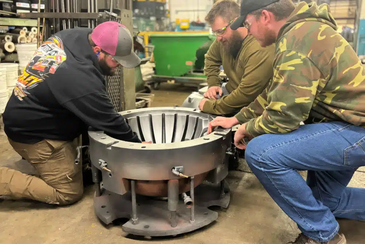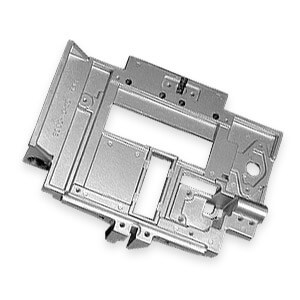Exploring the Ingenious Procedures Behind Modern Light Weight Aluminum Shop Procedures
Modern light weight aluminum factory operations are undergoing considerable transformation. Automation and AI are reshaping manufacturing techniques, enhancing both effectiveness and accuracy. The combination of 3D printing is streamlining mold and mildew production, while sustainability techniques are becoming more necessary. Each of these improvements plays a crucial role in redefining the industry. The effects of these changes extend past plain production effectiveness. What difficulties and chances lie in advance for light weight aluminum shops in this developing landscape?
The Role of Automation in Aluminum Foundries

Automation adds to boosted safety criteria within the factory atmosphere. By transferring unsafe tasks to machines, human employees can concentrate on managerial functions and high quality control, lessening the risk of mishaps. On top of that, information analytics acquired from automated processes offer beneficial insights into operational performance, leading to better decision-making and continual improvement. As the demand for aluminum products grows, the adoption of automation modern technologies will likely broaden, further changing the landscape of light weight aluminum factory procedures.
Innovations in Casting Technologies
Current improvements in casting technologies are changing light weight aluminum shop procedures. Advancements such as 3D printing assimilation, progressed alloy formulas, and automated procedure optimization are enhancing efficiency and product high quality. These developments are crucial in satisfying the advancing demands of the industry.
3D Printing Integration
Incorporating 3D printing technology right into aluminum factory procedures has transformed typical casting techniques, enhancing both performance and precision. This ingenious method enables the rapid manufacturing of intricate mold and mildews and cores, significantly decreasing preparations and material waste. By making use of additive manufacturing, shops can create intricate geometries that were difficult or previously difficult to achieve with traditional techniques. The adaptability of 3D printing additionally makes it possible for fast style alterations, promoting a much more nimble manufacturing process. Furthermore, this assimilation sustains using light-weight frameworks, which is increasingly crucial in sectors such as automobile and aerospace. As light weight aluminum shops continue to embrace 3D printing, they place themselves at the leading edge of technical improvement, driving improvements in item high quality and operational capacities.
Advanced Alloy Formulations
The development of innovative alloy formulations has actually greatly enhanced spreading modern technologies in aluminum foundry operations. These formulas incorporate various aspects, such as copper, silicon, and magnesium, to improve mechanical residential properties and thermal resistance. By tailoring the structure of light weight aluminum alloys, producers can accomplish certain performance qualities that meet the needs of varied applications, from automotive components to aerospace frameworks. The usage of advanced alloys additionally adds to lowered weight and enhanced stamina, which are crucial consider modern engineering. Furthermore, developments in alloy development allow better fluidity throughout casting, leading to enhanced surface finishes and decreased flaws. On the whole, progressed alloy formulations stand for a significant leap forward, placing light weight aluminum foundries to meet the developing requirements of various sectors properly.
Automated Refine Optimization
Innovations in casting modern technologies have actually led the way for automatic procedure improvement in light weight aluminum foundry procedures. By incorporating sophisticated software program and real-time data analytics, factories can now enhance manufacturing procedures and boost top quality control. Automated systems check variables such as cooling, pressure, and temperature level prices, permitting prompt changes that lessen defects and waste. Furthermore, artificial intelligence formulas evaluate historic efficiency information to forecast excellent settings, consequently enhancing effectiveness and reducing cycle times. Robotics likewise play a considerable duty, handling repetitive tasks that enhance security and precision. In general, these technologies not only drive operational performance however additionally enable foundries to satisfy the growing need for top quality light weight aluminum components in various industries.
Smart Production and Industry 4.0 Assimilation
The assimilation of Smart Production and Sector 4.0 within light weight aluminum shops is transforming functional performance. By leveraging IoT modern technologies, automation, and robotics, foundries can enhance manufacturing procedures and reduce downtime. Additionally, data analytics supplies vital insights that enhance decision-making and drive continuous enhancement.
IoT in Shop Procedures
As manufacturers progressively welcome the Internet of Points (IoT), shop procedures are experiencing a transformative shift towards smart manufacturing and Sector 4.0 integration. aluminum casting. IoT innovations enable real-time data collection and evaluation, boosting decision-making procedures and functional effectiveness. Sensors and linked tools keep track of equipment efficiency, material use, and ecological conditions, permitting positive upkeep and resource optimization. This connection fosters a much more dexterous production setting, where adjustments can be made quickly in reaction to market demands. Additionally, IoT facilitates improved traceability and quality assurance, as information from the entire production cycle can be quickly accessed and assessed. In general, the combination of IoT in factory procedures significantly improves performance and drives development in light weight aluminum production processes
Automation and Robotics Combination
Automation and robotics assimilation is transforming light weight aluminum foundry procedures by enhancing performance and accuracy. This transformative technique streamlines processes such as molding, putting, and finishing, lowering human mistake and raising result uniformity. By using sophisticated robot systems, foundries can attain greater manufacturing prices while maintaining strict quality requirements. Automated systems also allow real-time monitoring and flexible control, permitting quick adjustments to production parameters. Additionally, the combination of robotics minimizes labor expenses and mitigates safety risks connected with hand-operated handling of molten steel. As factories welcome smart manufacturing principles intrinsic in Sector 4.0, the synergy in between automation and robotics solidifies their competitive edge, leading the way for sustainable growth and development in the light weight aluminum spreading field.
Information Analytics for Performance
Using information analytics greatly boosts effectiveness within light weight aluminum factory procedures, straightening with smart manufacturing and Sector 4.0 principles. By leveraging real-time data collection and analysis, foundries can check manufacturing procedures, predict devices failings, and optimize source allowance. This data-driven technique facilitates insightful decision-making, allowing supervisors to boost and determine traffic jams operations. Additionally, predictive analytics empowers foundries to prepare for market needs, thus minimizing waste and ensuring prompt item shipment. Combination of data analytics with IoT gadgets enhances operational exposure, fostering an aggressive maintenance society. Inevitably, implementing these sophisticated logical techniques not just enhances efficiency yet also drives development, positioning aluminum foundries to fulfill the progressing demands of the sector while keeping competitive edges in a quickly transforming landscape.
Sustainable Practices in Light Weight Aluminum Casting
While the light weight aluminum spreading industry has typically faced ecological obstacles, numerous shops are currently embracing lasting methods to alleviate their influence (Aluminum Casting Company). A substantial focus has gotten on recycling aluminum scrap, which not just decreases waste however also preserves energy compared to main light weight aluminum production. Cutting-edge melting innovations, such as induction heaters, improve energy performance and lower greenhouse gas discharges
Furthermore, foundries are applying closed-loop water supply to decrease water usage and minimize thermal air pollution. Using environmentally friendly binders in mold-making processes is obtaining traction, additional lowering harmful emissions.
Furthermore, some centers are investing in renewable resource sources wikipedia reference to power procedures, lining up with international sustainability goals. By integrating these practices, the light weight aluminum casting industry is evolving towards a much more eco liable future, demonstrating that financial growth can coexist with ecological stewardship - Precision aluminum casting. These efforts show a commitment to sustainability and the importance of environmental accountability in manufacturing
Quality Control Innovations
As the light weight aluminum casting industry advances towards sustainability, the relevance of quality control technologies becomes increasingly evident. Modern light weight aluminum shops are embracing innovative modern technologies to improve their quality control processes. Techniques such as real-time surveillance and data analytics enable suppliers to spot defects and disparities early in the manufacturing cycle. Executing computerized evaluation systems equipped with maker finding out algorithms guarantees that products fulfill stringent quality criteria while decreasing human error.
The assimilation of non-destructive screening techniques, such as ultrasonic and radiographic assessments, provides deeper insights into the integrity of spreadings without damaging the material. These developments not just improve item reliability however also decrease waste, lining up with sustainability objectives. In enhancement, the adoption of standardized top quality frameworks helps streamline procedures throughout different foundries, assuring consistency in output. Jointly, these innovations are reshaping quality assurance, fostering a culture of excellence within the aluminum spreading field.
Future Fads in Light Weight Aluminum Shop Procedures
What advancements exist in advance for light weight aluminum foundry procedures? The future of aluminum factories is positioned for improvement via developments official site in automation, synthetic knowledge, and lasting techniques. The integration of robotics and automated systems is anticipated to improve efficiency and precision in the casting procedures, minimizing human error and labor prices. Additionally, AI-driven analytics will certainly make it possible for real-time monitoring and anticipating upkeep, enhancing functional performance and decreasing downtime.
Sustainability continues to be a centerpiece, with factories increasingly embracing environmentally friendly methods, such as utilizing recycled aluminum and establishing low-emission melting modern technologies. Advancements in 3D printing are likewise prepared for to revolutionize mold-making, permitting intricate geometries and minimized material waste. As the industry welcomes digitalization, data-driven decision-making will come to be critical, making it possible for factories to respond quickly to market demands. Collectively, these patterns assure to redefine aluminum factory operations, making them much more effective, lasting, and versatile to future difficulties.

Regularly Asked Concerns
What Security Measures Are Carried Out in Light Weight Aluminum Factory Operations?
Light weight aluminum foundry procedures apply different precaution, including personal safety tools, ventilation systems to take care of fumes, normal safety training, emergency situation action plans, and stringent surveillance of temperature and tools to stop accidents and assurance worker safety.
Just How Do Factories Handle Workforce Training for New Technologies?

What Materials Are Commonly Reused in Light Weight Aluminum Foundries?
Light weight aluminum foundries typically reuse scrap light weight aluminum, including post-consumer products like beverage containers, auto components, and building and construction materials. This recycling process decreases waste and saves resources, adding to a much more lasting light weight aluminum production sector.
Just How Does Light Weight Aluminum Spreading Influence the Setting?
Aluminum casting influences the setting with energy-intensive processes, greenhouse gas discharges, and possible local air pollution. Nonetheless, innovations in reusing and sustainable practices can minimize these impacts, promoting a much more environment-friendly method to aluminum production.
What Are the Normal Lead Times for Aluminum Spreading Projects?
Typical lead times for aluminum casting jobs differ significantly, generally varying from two to six weeks. Aspects affecting these timelines include intricacy, order size, about his and material schedule, affecting total manufacturing schedules in foundry procedures.
Automation progressively plays an essential role in light weight aluminum foundries, enhancing performance and precision in the manufacturing procedure. Developments in casting technologies have actually paved the way for computerized procedure improvement in light weight aluminum factory operations. Taking advantage of information analytics considerably enhances performance within light weight aluminum shop operations, aligning with clever manufacturing and Industry 4.0 concepts. A considerable focus has been on recycling aluminum scrap, which not just lowers waste yet likewise saves power compared to key aluminum manufacturing. Aluminum foundries frequently reuse scrap light weight aluminum, consisting of post-consumer products like beverage cans, automobile parts, and construction materials.